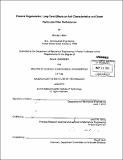Passive regeneration : long-term effects on ash characteristics and diesel particulate filter performance
Author(s)
Bahr, Michael J., Nav. E. (Michael James). Massachusetts Institute of Technology
DownloadFull printable version (21.67Mb)
Alternative title
Long-term effects on ash characteristics and diesel particulate filter performance
Other Contributors
Massachusetts Institute of Technology. Department of Mechanical Engineering.
Advisor
Victor W. Wong.
Terms of use
Metadata
Show full item recordAbstract
Diesel particulate filters (DPF) have seen widespread growth as an effective means for meeting increasingly rigorous particle emissions regulations. There is growing interest to exploit passive regeneration of DPFs to reduce fuel consumption accompanying traditional active regeneration. Incombustible material or ash, mainly derived from metallic additives in the engine lubricant, accumulates in the DPF over time. This ash accumulation increases flow restriction and rise in pressure drop across the DPF. The growth of pressure drop adversely impacts engine performance and fuel economy. This study built upon previous research to evaluate the different effects of regeneration strategy on ash packing and distribution within DPFs. Since passive regeneration relies on a catalyzed reaction, the interactions of ash with the catalyst will play an important role. Passive regeneration is specifically dependent on exhaust feed gas composition, exhaust conditions including temperature and flow rate, catalyst type and configuration, and the state of DPF loading during prior to passive regeneration. The goal of the study is to address the long-term effects of regeneration parameters on ash accumulations and the resulting impact of ash on the DPF catalyst performance. Experiments were conducted that focused on pressure drop measurements over the lifetime of diesel particulate filters with different regeneration methods coupled with post mortem ash characterization. These experiments provide insight to how these regeneration methods impact the DPF performance. These results, among few fundamental data of this kind, correlate changes in diesel particulate filter performance with exhaust conditions, regeneration strategy, and ash morphological characteristics. Outcomes are useful in optimizing the design of the combined engine-aftertreatment- lubricant system for future diesel engines, balancing the necessities of additives for adequate engine protection with the requirements for robust aftertreatment systems.
Description
Thesis (Nav. E. and S.M.)--Massachusetts Institute of Technology, Dept. of Mechanical Engineering, 2013. Cataloged from PDF version of thesis. Includes bibliographical references (p. 87-90).
Date issued
2013Department
Massachusetts Institute of Technology. Department of Mechanical EngineeringPublisher
Massachusetts Institute of Technology
Keywords
Mechanical Engineering.